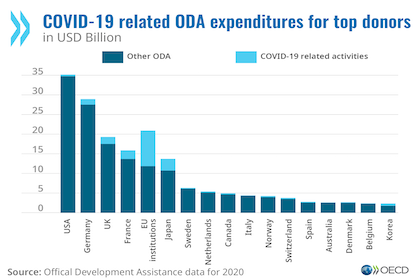Economy: Policy reset can deliver a stronger, more resilient, equitable and sustainable post-pandemic recovery
14/04/2021 – The COVID-19 pandemic has brought social and economic disruption worldwide, but is also providing governments with the opportunity to put economies on a more sustainable and inclusive growth path while addressing the underlying challenges, according to the OECD’s Going for Growth policy report.
Going for Growth 2021: Shaping a Vibrant Recovery analyses pre-existing weaknesses as well as those brought on by the pandemic, and offers policy makers country-specific advice to seize the opportunity for a fundamental reset.
OECD Secretary-General Angel Gurría and Italian Minister of Economy and Finance Daniele Franco launched the report shortly after the second meeting of G20 finance ministers and central bank governors under the Italian Presidency on 7 April. Its recommendations provide a basis for G20 discussions on strategies to push forward a vibrant economic recovery and promote higher-quality growth.
“The pandemic is a painful reminder that the nature of our past growth was often unsustainable and left many people behind,” Mr Gurría said. “The recovery is an opportunity to set our policies right, to achieve growth that is stronger, equitable, sustainable and more resilient. And for this to happen, governments have to act now.”
Going for Growth 2021: Shaping a Vibrant Recovery provides a framework for policy reform covering three key dimensions:
- Building resilience and sustainability: Structural policies can improve the first line of defence to shocks (health care and social safety nets, critical infrastructure), improve public governance, and strengthen firms’ incentives to better take longer-term sustainability considerations into account.
- Facilitating reallocation and boosting productivity growth. Steering growth in a more durable, resilient and inclusive direction requires structural policy action to increase job dynamism and support firms becoming more dynamic, more innovative and greener.
- Supporting people through transitions. Policies should ensure that people are not left behind in transitions, so that reallocation is socially productive and builds resilience. This requires investments in skills, training and a big push for accessing quality jobs – particularly amongst vulnerable groups – as well as broad-based social safety nets, and better learning and support to access jobs.
Going for Growth policy advice includes short country notes for OECD members and a number of Partner countries (Argentina, Brazil, China, India, Indonesia and South Africa).
The report also highlights the crucial importance of countries acting together – in particular in the case of challenges that span borders. Going for Growth identifies a number of areas where international co-operation is needed to enhance the effectiveness of domestic policies and underpin the shift to more sustainable, resilient and equitable globalisation: healthcare, climate change, international trade and the taxation of multinational enterprises.
Key recommendations and individual country notes on OECD and key non-member countries are accessible at: https://www.oecd.org/economy/going-for-growth/. You are invited to include this link in media coverage of the report.
For further information on Going for Growth 2021 or to arrange interviews, journalists should contact Lawrence Speer (+33 1 4524 7970) or the OECD Media Office (+33 1 4524 9700).
Working with over 100 countries, the OECD is a global policy forum that promotes policies to improve the economic and social well-being of people around the world.
 Foreign aid rose in a year that saw all other major flows of income for developing countries – trade, foreign direct investment and remittances – decline due to the pandemic, and domestic resources under increased pressure. Total external private finance to developing countries fell 13% in 2020 and trade volumes declined by 8.5%. (
Foreign aid rose in a year that saw all other major flows of income for developing countries – trade, foreign direct investment and remittances – decline due to the pandemic, and domestic resources under increased pressure. Total external private finance to developing countries fell 13% in 2020 and trade volumes declined by 8.5%. (